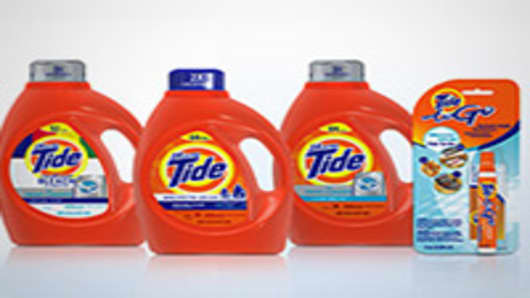The pressure on retailers just got racheted up a notch.
Consumer products giant Procter & Gamble is taking hundreds of its products directly to consumers through a new Web site it is testing. This move will put the manufacturer of products such as Tide detergent, Pampers diapers and Gillette shavers in direct competition with the some of its biggest customers, traditional retailers.
Although many products are sold online through retail Web sites, household products have been slow to shift online. Part of the problem has been logistical as products such as laundry detergent and diapers are bulky and expensive to ship.
However, in recent months, Web sites have been finding ways around these hurdles and entering the space. This includes Wal-Mart Stores , which recently began shipping beauty products, Amazon.com , and independent online-only retailers such as Alice.com.
At the same time, P&G has been exploring its possibilities online. It bought a stake in British online grocer Ocado, mainly to study its business and has been doing "job swaps" with Google , to better understand the online world.
P&G's acquisition of Gillette, which owned a third-party Web site The Essentials, also helped increase the company's knowledge of online retailing.
According to the Associated Press, P&G's latest venture, the eStore, will be run by PFSweb , a Plano, Texas, manager of ecommerce sites including that of cosmetics retailer Sephora.
It's unclear what the pricing strategy will be at this time, but shipping will initially be a flat rate of $5, the report said.
Although online sales generally are surging throughout the retail industry, online sales are only a very small fraction of P&G's total revenue. (According to the AP, only about $500 million of $79 billion in annual revenue, or 0.6 percent, and that is mostly through Amazon.com, Walmart.com and other retailers.)
Although P&G continues to say that it does not want to be in the retail business, it's easy to see why they at least want to explore their options.
Not only are more sales shifting online and that could be a potential way for it to improve its profit margins on products, it could give them more leverage with retailers.
Wall Street Strategies retail industry analyst Brian Sozzi notes that Target , Wal-Mart and Costco have been trying to manage their costs by eliminating products that don't sell quickly.
"Target, for example, no longer offers 80-plus kinds of shampoo," Sozzi said. "Wal-Mart's stores no longer pile inventory on top of shelves, saving them money and making the store much more open/easy to shop."
That's been bad news for P&G and other consumers products companies that have long relied on product innovation to stir up consumer demand.
"I see the P&G news as a fight back by a consumer products company who believes every one of their products has a customer need," said Sozzi, who does not cover P&G.
It should be noted that traditional retailers are paying close attention.
At this week's National Retail Federation convention, there was quite a bit of discussion about how retailers that operate both Web sites and "brick and mortar" stores have to marry the advantage of both shopping environments and integrate the two channels together more smoothly.
There also was an acknowledgement by several retailers including Saks CEO Steve Sadove that often the best retail customers are those that shop online and in their stores.
Target, which has used Amazon to provide its technology platform and fulfillment services, is among those companies that appear to be looking to gain more control over their ecommerce sites.
On Monday, the company announced it hired Sapient, IBM and several other vendors to relaunch its Web site in time for the 2011 holiday season.
Meanwhile, Alice.com, which sells household products from a variety of manufactures through its Web site with free shipping, has launched an ecommerce platform that allows consumer packaged goods manufacturers to place a branded storefronts on their own Web sites. Once there, the customer can shop all of the products available through Alice.com.
Alice co-founder Mark McGuire has been urging manufacturers to ban together to sell their products, much like airlines do with sites like Orbitz, to market their products to consumers.
"It's hard to wall yourself off," McGuire said. "Consumers want a one-trip shopping experience."
More from Consumer Nation:
- Deprivation & Consumers: Is There a Case for Renewed Spending?
- Your Smartphone Can Change the World, One Dollar at a Time
- The Face of the New Luxury Customer
- What's on Retailers' Minds? Jobs, Jobs, and More Jobs
- Your Smartphone Can Change the World, One Dollar at a Time
Questions? Comments? Email us at consumernation@cnbc.com




